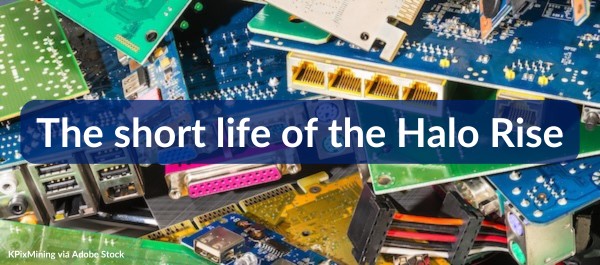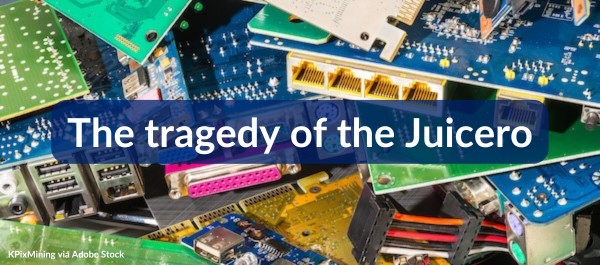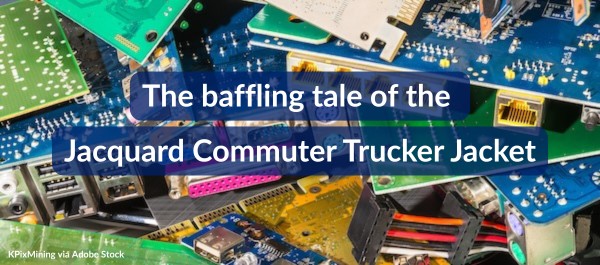
John,
As the old saying goes, one person's trash is another's treasure.
Yet even when you or I might not understand the appeal of a new tech gadget, it's still shocking how quickly some of these gizmos end up as literal trash.
To make the matter worse, manufacturers have the power to turn many electronics into useless bricks just by discontinuing support. According to our research partners' Electronic Graveyard report, expiring software has caused at least 130 million pounds of e-waste since 2014.1
Here are some of the most remarkable examples of tech products that started as a shiny new idea but end up rusting away in landfills:

The purpose of Amazon's Halo Rise was simple, if a little creepy. It watched you while you slept. To be more specific, it tracked your sleeping schedule and acted as a smart alarm clock.
But fans of the Halo Rise wouldn't be able to enjoy it for long. On July 31, 2023, less than a year after the product launched, Amazon stopped supporting the device. Without working software, every Halo Rise became worthless junk in a matter of days.2
The Halo Rise epitomizes the short lifespans of many modern tech devices. Even though customers got their money back, the end result was still hundreds of thrown-out devices polluting our communities with their toxic metals.

The Juicero lasted a little longer than the Amazon Halo, but its story is just as absurd. Marketed as the next-generation juicer, the Juicero had everything from wifi-connection and a smartphone app to a scanner that it used to refuse to squeeze anything but proprietary Juicero fruit pouches.
There was only one problem. Consumers soon discovered that the Juicero fruit pouches could be squeezed by hand, making the $400 squeezer completely useless.3
The company folded soon after, and without its app, the Juicero became junk.

You've seen smartphones, and you've seen denim jackets. But what if you could combine the two? Born of an unlikely union between Levi's and Google, the Jacquard Commuter Trucker Jacket offered a jacket lined with wires that enabled you to control your phone by tapping the sleeve.4
Although the product remained operational for a few years, it never really found its audience, if an audience ever existed at all. In April 2023, the manufacturers decided to pull the plug, ending all software services and turning the Jacquard Commuter Trucker Jacket into just a jacket full of metal.
It would be better if Silicon Valley created fewer destined-to-fail devices that serve little to no purpose. But if a company makes a product that depends on software support, it should commit to support that product for its lifetime. We don't need more toxic junk in our landfills.
Thank you,
Faye Park
President
P.S: Want to help reduce e-waste by making products last longer? Donate to power PIRG's advocacy.
1. Lucas Gutterman, "Electronic waste graveyard," U.S. PIRG Education Fund, April 10, 2025.
2. Todd Bishop, "Amazon's Halo disappears: Tech giant discontinues health devices and service, promises refunds," GeekWire, April 26, 2023.
3. Claire Reilly, "Juicero is still the greatest example of Silicon Valley stupidity," CNET, September 1, 2018.
4. "Designing the Levi's Commuter Trucker Jacket with Jacquard by Google," IDEO, Last accessed May 20, 2025.
Support U.S. PIRG. Contributions by people just like you make our advocacy possible. Your contribution supports a staff of organizers, attorneys, scientists and other professionals who monitor government and corporate decisions and advocate on the public's behalf.
Join us on Facebook | Follow us on Twitter
U.S. PIRG, Main Office: 1543 Wazee St., Suite 460, Denver, CO 80202, (303) 801-0582
Federal Advocacy Office: 600 Pennsylvania Ave. SE, 4th Fl., Washington, DC 20003, (202) 546-9707
Member Questions or Requests: 1-800-838-6554.

If you want us to stop sending you email then follow this link -- unsubscribe.